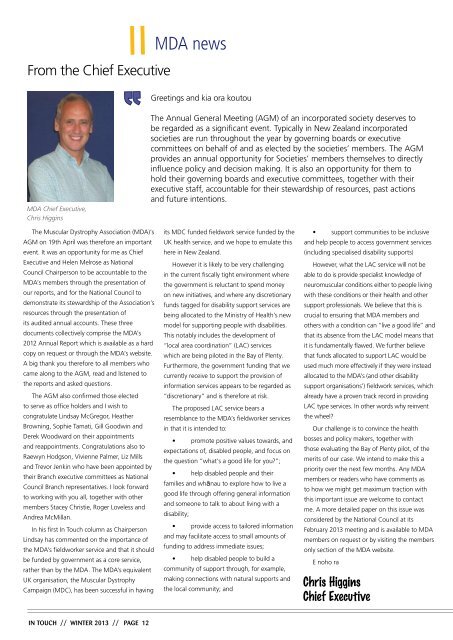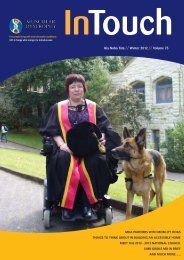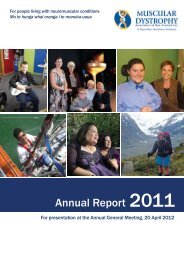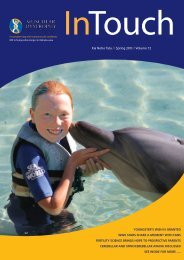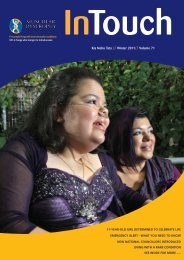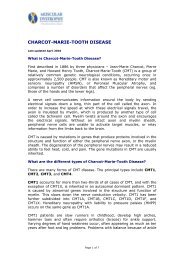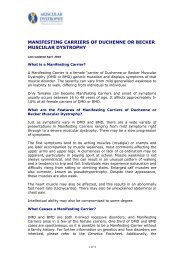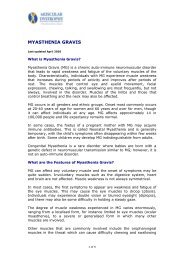Winter 2013 In Touch - Muscular Dystrophy Association of New ...
Winter 2013 In Touch - Muscular Dystrophy Association of New ...
Winter 2013 In Touch - Muscular Dystrophy Association of New ...
You also want an ePaper? Increase the reach of your titles
YUMPU automatically turns print PDFs into web optimized ePapers that Google loves.
From the Chief Executive<br />
MDA news<br />
Greetings and kia ora koutou<br />
MDA Chief Executive,<br />
Chris Higgins<br />
The Annual General Meeting (AGM) <strong>of</strong> an incorporated society deserves to<br />
be regarded as a significant event. Typically in <strong>New</strong> Zealand incorporated<br />
societies are run throughout the year by governing boards or executive<br />
committees on behalf <strong>of</strong> and as elected by the societies’ members. The AGM<br />
provides an annual opportunity for Societies’ members themselves to directly<br />
influence policy and decision making. It is also an opportunity for them to<br />
hold their governing boards and executive committees, together with their<br />
executive staff, accountable for their stewardship <strong>of</strong> resources, past actions<br />
and future intentions.<br />
The <strong>Muscular</strong> <strong>Dystrophy</strong> <strong>Association</strong> (MDA)’s<br />
AGM on 19th April was therefore an important<br />
event. It was an opportunity for me as Chief<br />
Executive and Helen Melrose as National<br />
Council Chairperson to be accountable to the<br />
MDA’s members through the presentation <strong>of</strong><br />
our reports, and for the National Council to<br />
demonstrate its stewardship <strong>of</strong> the <strong>Association</strong>’s<br />
resources through the presentation <strong>of</strong><br />
its audited annual accounts. These three<br />
documents collectively comprise the MDA’s<br />
2012 Annual Report which is available as a hard<br />
copy on request or through the MDA’s website.<br />
A big thank you therefore to all members who<br />
came along to the AGM, read and listened to<br />
the reports and asked questions.<br />
The AGM also confirmed those elected<br />
to serve as <strong>of</strong>fice holders and I wish to<br />
congratulate Lindsay McGregor, Heather<br />
Browning, Sophie Tamati, Gill Goodwin and<br />
Derek Woodward on their appointments<br />
and reappointments. Congratulations also to<br />
Raewyn Hodgson, Vivienne Palmer, Liz Mills<br />
and Trevor Jenkin who have been appointed by<br />
their Branch executive committees as National<br />
Council Branch representatives. I look forward<br />
to working with you all, together with other<br />
members Stacey Christie, Roger Loveless and<br />
Andrea McMillan.<br />
<strong>In</strong> his first <strong>In</strong> <strong>Touch</strong> column as Chairperson<br />
Lindsay has commented on the importance <strong>of</strong><br />
the MDA’s fieldworker service and that it should<br />
be funded by government as a core service,<br />
rather than by the MDA. The MDA’s equivalent<br />
UK organisation, the <strong>Muscular</strong> <strong>Dystrophy</strong><br />
Campaign (MDC), has been successful in having<br />
its MDC funded fieldwork service funded by the<br />
UK health service, and we hope to emulate this<br />
here in <strong>New</strong> Zealand.<br />
However it is likely to be very challenging<br />
in the current fiscally tight environment where<br />
the government is reluctant to spend money<br />
on new initiatives, and where any discretionary<br />
funds tagged for disability support services are<br />
being allocated to the Ministry <strong>of</strong> Health’s new<br />
model for supporting people with disabilities.<br />
This notably includes the development <strong>of</strong><br />
“local area coordination” (LAC) services<br />
which are being piloted in the Bay <strong>of</strong> Plenty.<br />
Furthermore, the government funding that we<br />
currently receive to support the provision <strong>of</strong><br />
information services appears to be regarded as<br />
“discretionary” and is therefore at risk.<br />
The proposed LAC service bears a<br />
resemblance to the MDA’s fieldworker services<br />
in that it is intended to:<br />
• promote positive values towards, and<br />
expectations <strong>of</strong>, disabled people, and focus on<br />
the question “what’s a good life for you?”;<br />
• help disabled people and their<br />
families and whānau to explore how to live a<br />
good life through <strong>of</strong>fering general information<br />
and someone to talk to about living with a<br />
disability;<br />
• provide access to tailored information<br />
and may facilitate access to small amounts <strong>of</strong><br />
funding to address immediate issues;<br />
• help disabled people to build a<br />
community <strong>of</strong> support through, for example,<br />
making connections with natural supports and<br />
the local community; and<br />
• support communities to be inclusive<br />
and help people to access government services<br />
(including specialised disability supports)<br />
However, what the LAC service will not be<br />
able to do is provide specialist knowledge <strong>of</strong><br />
neuromuscular conditions either to people living<br />
with these conditions or their health and other<br />
support pr<strong>of</strong>essionals. We believe that this is<br />
crucial to ensuring that MDA members and<br />
others with a condition can “live a good life” and<br />
that its absence from the LAC model means that<br />
it is fundamentally flawed. We further believe<br />
that funds allocated to support LAC would be<br />
used much more effectively if they were instead<br />
allocated to the MDA’s (and other disability<br />
support organisations’) fieldwork services, which<br />
already have a proven track record in providing<br />
LAC type services. <strong>In</strong> other words why reinvent<br />
the wheel?<br />
Our challenge is to convince the health<br />
bosses and policy makers, together with<br />
those evaluating the Bay <strong>of</strong> Plenty pilot, <strong>of</strong> the<br />
merits <strong>of</strong> our case. We intend to make this a<br />
priority over the next few months. Any MDA<br />
members or readers who have comments as<br />
to how we might get maximum traction with<br />
this important issue are welcome to contact<br />
me. A more detailed paper on this issue was<br />
considered by the National Council at its<br />
February <strong>2013</strong> meeting and is available to MDA<br />
members on request or by visiting the members<br />
only section <strong>of</strong> the MDA website.<br />
E noho ra<br />
Chris Higgins<br />
Chief Executive<br />
in touch // <strong>Winter</strong> <strong>2013</strong> // PAGE 12


